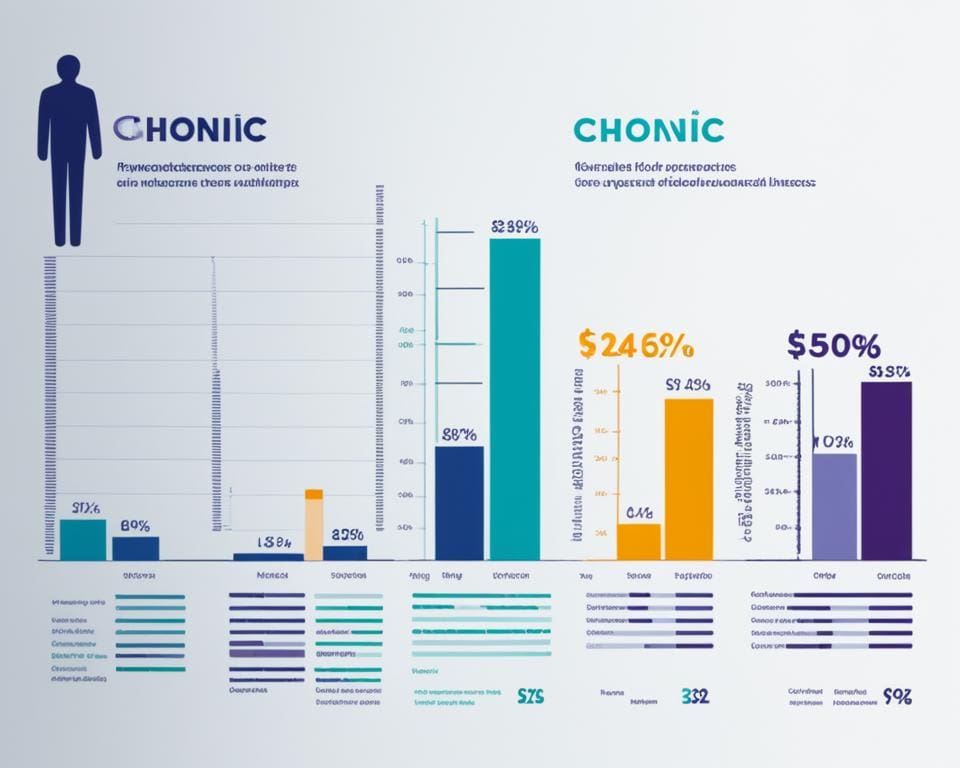Understanding what are chronic diseases is essential for improving health outcomes and quality of life. Chronic diseases, or long-term illnesses, are persistent health conditions that often require ongoing management, impacting millions of individuals globally. According to the Centers for Disease Control and Prevention (CDC), nearly 6 in 10 adults in the U.S. are living with at least one chronic health condition. These illnesses, which include diabetes, heart disease, and arthritis, can stem from a combination of genetic, lifestyle, and environmental factors. The World Health Organization (WHO) emphasizes the gravity of the situation, revealing that chronic diseases account for 71% of global deaths each year. The National Institutes of Health (NIH) stresses the critical need for effective prevention strategies to mitigate this burden. Together, we can conquer the understanding of chronic diseases and promote healthier lives.
Exploring the World of Chronic Diseases
Chronic diseases encompass a wide range of conditions that impact millions of individuals across the globe. *Defining chronic diseases* involves recognizing their long-lasting nature, requiring ongoing care and lifestyle adjustments. These chronic health conditions alter normal bodily functions, leading to various physical, emotional, and social challenges.
Defining Chronic Diseases
Chronic diseases typically manifest as long-term illnesses that can hinder daily activities significantly. The symptoms associated with chronic illnesses vary greatly, affecting everything from physical capabilities to mental health. Common chronic diseases, such as heart disease, diabetes, and arthritis, require patients to engage in proactive management to improve their quality of life.
Key Statistics on Chronic Diseases
Understanding chronic disease statistics is essential to grasp the escalating impact of these health concerns. In the United States, reports indicate that nearly half of all adults live with at least one chronic health condition. Heart disease remains a leading cause of death, with alarming figures of approximately 697,000 lives claimed annually. Awareness of chronic disease statistics underlines the importance of prevention and management strategies.
The Impact of Chronic Health Conditions on Daily Life
Chronic health conditions profoundly affect various aspects of life, presenting emotional tolls, social interactions, and workplace productivity challenges. Living with chronic illness symptoms can create barriers to achieving personal and professional goals. Access to healthcare remains a significant hurdle for many, with studies revealing that two-fifths of adults with chronic illnesses report limitations in their daily activities. Mental health consequences are also prevalent, including higher rates of anxiety and depression among those managing long-term illnesses.

What Are Chronic Diseases: Common Types and Symptoms
A variety of common chronic diseases not only challenge individuals but also impact the broader health landscape. Awareness and understanding of these conditions aid in prevention and effective management, ensuring a better quality of life.
Common Chronic Diseases You Should Know About
According to the CDC, some of the most prevalent common chronic diseases include:
- Diabetes
- Heart Disease
- Chronic Respiratory Diseases
- Cancer
The American Diabetes Association mentions that over 34 million Americans grapple with diabetes, underscoring the urgent need for education and awareness surrounding this condition. Arthritis, a significant chronic condition, impacts nearly 54 million adults as reported by the Arthritis Foundation, affecting mobility and everyday activities. These statistics highlight the importance of chronic disease management strategies to enhance overall well-being.
Recognizing Chronic Illness Symptoms
Early recognition of chronic illness symptoms is crucial for effective treatment. While symptoms can vary based on the specific condition, some indicators commonly observed include:
- Fatigue
- Pain
- Uncontrolled blood sugar levels in diabetes
The Mayo Clinic emphasizes the need for seeking medical advice when experiencing persistent symptoms. Resources provided by the National Institute of Health offer guidance in identifying these symptoms early, which can lead to better outcomes. Healthline discusses how proactive management and early recognition significantly improve the quality of life for individuals living with chronic diseases.
Managing Chronic Diseases for a Healthier Life
Effective chronic disease management is essential for improving health outcomes and enhancing the quality of life for those affected. This involves a multifaceted approach that combines lifestyle changes, medication adherence, and regular medical check-ups. For instance, the CDC’s Healthy People 2030 initiative emphasizes the significance of preventive measures aimed at reducing the burden of chronic diseases. By focusing on early interventions and health education, individuals can significantly improve their health status and well-being.
Chronic disease prevention strategies play a pivotal role in enabling individuals to take charge of their health. Maintaining a balanced diet, engaging in regular physical activity, and managing stress effectively are fundamental components of a healthier lifestyle. Organizations like the American Heart Association underscore the importance of these lifestyle changes, particularly in heart disease management, where healthy living is directly linked to better health outcomes. The integration of exercise and nutritious foods can pave the way for a robust defense against chronic illnesses.
Moreover, understanding chronic disease treatment options is vital for sustained health. The National Institute of Diabetes and Digestive and Kidney Diseases outlines comprehensive strategies for diabetes management, highlighting the importance of self-monitoring and tailored dietary choices. By actively participating in their health journey, individuals can not only manage existing conditions but also prevent potential complications, ultimately leading to a more fulfilling and healthier life.









